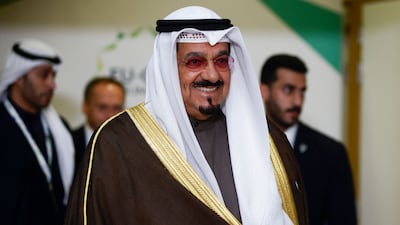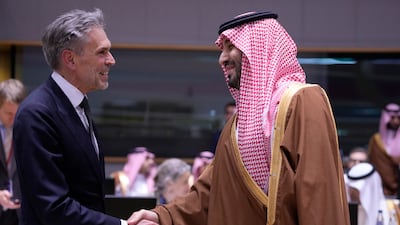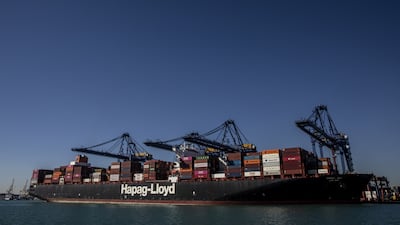As the European Commission prepares for its new term next month, on the heels of the first EU-GCC Summit in October, Gulf countries will be looking to finally secure a free trade agreement after talks began in the late 1980s. Success may depend on Gulf countries studying the EU’s complex structure and processes more closely.
The EU is a strong proponent of regionalism, and while it is open to free trade agreements with individual countries, it favours dealing with economic blocs. For this reason, ever since the then-European Economic Community and GCC established contact in the 1980s, such a deal has been high on the agenda. Unfortunately, a variety of disagreements on economic and non-economic issues have impeded progress, leading to the GCC unilaterally suspending negotiations in 2008.
However, that was at a time when economic diversification was not the utmost priority for the Gulf. Today, that is no longer the case, with the region’s collective strategy to reduce its economic dependence on hydrocarbons being arguably the most important element of its policy programmes.
A free trade agreement with the EU is especially attractive because it offers Gulf countries tariff-free access to one of the largest markets in the world. Many of the industries that Gulf countries are investing in, such as renewable energy and military manufacturing, exhibit “economies of scale”, meaning that the higher the production level, the lower the unit cost. Being able to sell competitively to the half-a-billion EU residents is a potential gamechanger from the perspective of production efficiency, and it is therefore an important plank on the road to a knowledge economy.
On the flipside, securing a deal with the GCC offers EU exporters a considerable advantage over their competitors from East Asia, at a time when much of the bloc’s economy is experiencing sluggish growth. Moreover, it would provide it with a much-needed confidence boost in its efforts to propagate multilateralism and rule of law globally, as the GCC is a significant bloc economically and diplomatically.
Should the GCC be convinced of the advantages of reopening negotiations with the EU, its member states may benefit from a larger investment in understanding their prospective partners.
The EU is an exceptionally complex system that most Europeans themselves struggle to comprehend. Its byzantine structures are rendered even more impregnable by the fact that underneath the bloc’s supranational institutions lie the traditional government institutions of 27 diverse and sovereign states. Moreover, each of these countries has a rich civil society and a vibrant, independent private sector, multiplying the number of relevant actors to an unfathomable degree.
When dealing with one another, GCC members are used to agreeing about issues at the level of heads of state internationally, and then leaving each country the task of filling in the gaps domestically. While GCC-level committees exist in a number of areas, their deference to the upper echelons of government is unquestionable, making negotiations structurally straightforward.
Should the GCC be convinced of the advantages of reopening negotiations with the EU, its member states may benefit from a larger investment in understanding their prospective partners
However, this kind of approach is unsuited to the EU, where a comparable hierarchy is absent by design, and where the multiplicity of government and non-government stakeholders transforms negotiations into a Herculean task.
Hercules did eventually triumph in his mythical missions, and a critical element of his success was understanding what he needed to do. In the Gulf, while there exist many impressive universities, there is a dearth of European studies programmes. Gulf diplomats working in Europe surely gain valuable knowledge of the EU’s peculiar systems, but there is no substitute for acquiring a scientific understanding of the bloc through the accumulation of rigorous, interdisciplinary research.
The near absence of European studies programmes in some Gulf countries is symptomatic of a broader lack of area studies programmes, be it Chinese studies, American studies, African studies, Iranian studies and so on. This can sometimes be seen in the Gulf think tank circuit that supports foreign policy: not enough researchers speak any language except Arabic and English, regardless of their area of expertise. On the other hand, foreign researchers focusing on the Gulf often have at least a basic understanding of Arabic, in addition to English and their native tongue.
While there are a number of reasons why Israel and Turkey have prevailed in their free trade negotiations with the EU, it is notable that both countries have an abundance of European studies programmes in their universities. Their private sector and civil society links to Europe, developed over a long period of time, also run deep. This plays an important supporting role in negotiations.
The lack of area studies programmes in the GCC cannot be resolved by merely establishing a sufficient number, as students have to want to enrol in them. That requires a cultural curiosity among students in the Gulf that translates into a greater number of enrolments – proportional to the levels we see in countries such as the US. Otherwise, the knowledge that can critically support complex negotiations will accumulate too slowly.
The increasing incidence of EU-GCC exchange programmes is certainly a step in the right direction, as is the rise in the frequency of track 1 and track 2 dialogues between the two blocs. However, for GCC countries to fully realise their potential, greater investment in gaining a scientific, interdisciplinary understanding of their European brethren is crucial.
The specs
Engine: 4.0-litre V8 twin-turbocharged and three electric motors
Power: Combined output 920hp
Torque: 730Nm at 4,000-7,000rpm
Transmission: 8-speed dual-clutch automatic
Fuel consumption: 11.2L/100km
On sale: Now, deliveries expected later in 2025
Price: expected to start at Dh1,432,000
The specs
Engine: 2.0-litre 4-cyl turbo
Power: 247hp at 6,500rpm
Torque: 370Nm from 1,500-3,500rpm
Transmission: 10-speed auto
Fuel consumption: 7.8L/100km
Price: from Dh94,900
On sale: now
Killing of Qassem Suleimani
Key facilities
- Olympic-size swimming pool with a split bulkhead for multi-use configurations, including water polo and 50m/25m training lanes
- Premier League-standard football pitch
- 400m Olympic running track
- NBA-spec basketball court with auditorium
- 600-seat auditorium
- Spaces for historical and cultural exploration
- An elevated football field that doubles as a helipad
- Specialist robotics and science laboratories
- AR and VR-enabled learning centres
- Disruption Lab and Research Centre for developing entrepreneurial skills
BMW M5 specs
Engine: 4.4-litre twin-turbo V-8 petrol enging with additional electric motor
Power: 727hp
Torque: 1,000Nm
Transmission: 8-speed auto
Fuel consumption: 10.6L/100km
On sale: Now
Price: From Dh650,000
What the law says
Micro-retirement is not a recognised concept or employment status under Federal Decree Law No. 33 of 2021 on the Regulation of Labour Relations (as amended) (UAE Labour Law). As such, it reflects a voluntary work-life balance practice, rather than a recognised legal employment category, according to Dilini Loku, senior associate for law firm Gateley Middle East.
“Some companies may offer formal sabbatical policies or career break programmes; however, beyond such arrangements, there is no automatic right or statutory entitlement to extended breaks,” she explains.
“Any leave taken beyond statutory entitlements, such as annual leave, is typically regarded as unpaid leave in accordance with Article 33 of the UAE Labour Law. While employees may legally take unpaid leave, such requests are subject to the employer’s discretion and require approval.”
If an employee resigns to pursue micro-retirement, the employment contract is terminated, and the employer is under no legal obligation to rehire the employee in the future unless specific contractual agreements are in place (such as return-to-work arrangements), which are generally uncommon, Ms Loku adds.
UAE currency: the story behind the money in your pockets
More coverage from the Future Forum
Brief scoreline:
Manchester United 2
Rashford 28', Martial 72'
Watford 1
Doucoure 90'
SOUTH%20KOREA%20SQUAD
%3Cp%3E%0D%3Cstrong%3EGoalkeepers%3A%20%3C%2Fstrong%3EKim%20Seung-gyu%2C%20Jo%20Hyeon-woo%2C%20Song%20Bum-keun%0D%3Cbr%3E%3Cstrong%3EDefenders%3A%20%3C%2Fstrong%3EKim%20Young-gwon%2C%20Kim%20Min-jae%2C%20Jung%20Seung-hyun%2C%20Kim%20Ju-sung%2C%20Kim%20Ji-soo%2C%20Seol%20Young-woo%2C%20Kim%20Tae-hwan%2C%20Lee%20Ki-je%2C%20Kim%20Jin-su%0D%3Cbr%3E%3Cstrong%3EMidfielders%3A%20%3C%2Fstrong%3EPark%20Yong-woo%2C%20Hwang%20In-beom%2C%20Hong%20Hyun-seok%2C%20Lee%20Soon-min%2C%20Lee%20Jae-sung%2C%20Lee%20Kang-in%2C%20Son%20Heung-min%20(captain)%2C%20Jeong%20Woo-yeong%2C%20Moon%20Seon-min%2C%20Park%20Jin-seob%2C%20Yang%20Hyun-jun%0D%3Cbr%3E%3Cstrong%3EStrikers%3A%20%3C%2Fstrong%3EHwang%20Hee-chan%2C%20Cho%20Gue-sung%2C%20Oh%20Hyeon-gyu%3C%2Fp%3E%0A
Three tips from La Perle's performers
1 The kind of water athletes drink is important. Gwilym Hooson, a 28-year-old British performer who is currently recovering from knee surgery, found that out when the company was still in Studio City, training for 12 hours a day. “The physio team was like: ‘Why is everyone getting cramps?’ And then they realised we had to add salt and sugar to the water,” he says.
2 A little chocolate is a good thing. “It’s emergency energy,” says Craig Paul Smith, La Perle’s head coach and former Cirque du Soleil performer, gesturing to an almost-empty open box of mini chocolate bars on his desk backstage.
3 Take chances, says Young, who has worked all over the world, including most recently at Dragone’s show in China. “Every time we go out of our comfort zone, we learn a lot about ourselves,” she says.
Dust and sand storms compared
Sand storm
- Particle size: Larger, heavier sand grains
- Visibility: Often dramatic with thick "walls" of sand
- Duration: Short-lived, typically localised
- Travel distance: Limited
- Source: Open desert areas with strong winds
Dust storm
- Particle size: Much finer, lightweight particles
- Visibility: Hazy skies but less intense
- Duration: Can linger for days
- Travel distance: Long-range, up to thousands of kilometres
- Source: Can be carried from distant regions
Other workplace saving schemes
- The UAE government announced a retirement savings plan for private and free zone sector employees in 2023.
- Dubai’s savings retirement scheme for foreign employees working in the emirate’s government and public sector came into effect in 2022.
- National Bonds unveiled a Golden Pension Scheme in 2022 to help private-sector foreign employees with their financial planning.
- In April 2021, Hayah Insurance unveiled a workplace savings plan to help UAE employees save for their retirement.
- Lunate, an Abu Dhabi-based investment manager, has launched a fund that will allow UAE private companies to offer employees investment returns on end-of-service benefits.
A list of the animal rescue organisations in the UAE
10 tips for entry-level job seekers
- Have an up-to-date, professional LinkedIn profile. If you don’t have a LinkedIn account, set one up today. Avoid poor-quality profile pictures with distracting backgrounds. Include a professional summary and begin to grow your network.
- Keep track of the job trends in your sector through the news. Apply for job alerts at your dream organisations and the types of jobs you want – LinkedIn uses AI to share similar relevant jobs based on your selections.
- Double check that you’ve highlighted relevant skills on your resume and LinkedIn profile.
- For most entry-level jobs, your resume will first be filtered by an applicant tracking system for keywords. Look closely at the description of the job you are applying for and mirror the language as much as possible (while being honest and accurate about your skills and experience).
- Keep your CV professional and in a simple format – make sure you tailor your cover letter and application to the company and role.
- Go online and look for details on job specifications for your target position. Make a list of skills required and set yourself some learning goals to tick off all the necessary skills one by one.
- Don’t be afraid to reach outside your immediate friends and family to other acquaintances and let them know you are looking for new opportunities.
- Make sure you’ve set your LinkedIn profile to signal that you are “open to opportunities”. Also be sure to use LinkedIn to search for people who are still actively hiring by searching for those that have the headline “I’m hiring” or “We’re hiring” in their profile.
- Prepare for online interviews using mock interview tools. Even before landing interviews, it can be useful to start practising.
- Be professional and patient. Always be professional with whoever you are interacting with throughout your search process, this will be remembered. You need to be patient, dedicated and not give up on your search. Candidates need to make sure they are following up appropriately for roles they have applied.
Arda Atalay, head of Mena private sector at LinkedIn Talent Solutions, Rudy Bier, managing partner of Kinetic Business Solutions and Ben Kinerman Daltrey, co-founder of KinFitz
UAE currency: the story behind the money in your pockets
How to apply for a drone permit
- Individuals must register on UAE Drone app or website using their UAE Pass
- Add all their personal details, including name, nationality, passport number, Emiratis ID, email and phone number
- Upload the training certificate from a centre accredited by the GCAA
- Submit their request
What are the regulations?
- Fly it within visual line of sight
- Never over populated areas
- Ensure maximum flying height of 400 feet (122 metres) above ground level is not crossed
- Users must avoid flying over restricted areas listed on the UAE Drone app
- Only fly the drone during the day, and never at night
- Should have a live feed of the drone flight
- Drones must weigh 5 kg or less
Episode list:
Ep1: A recovery like no other- the unevenness of the economic recovery
Ep2: PCR and jobs - the future of work - new trends and challenges
Ep3: The recovery and global trade disruptions - globalisation post-pandemic
Ep4: Inflation- services and goods - debt risks
Ep5: Travel and tourism












